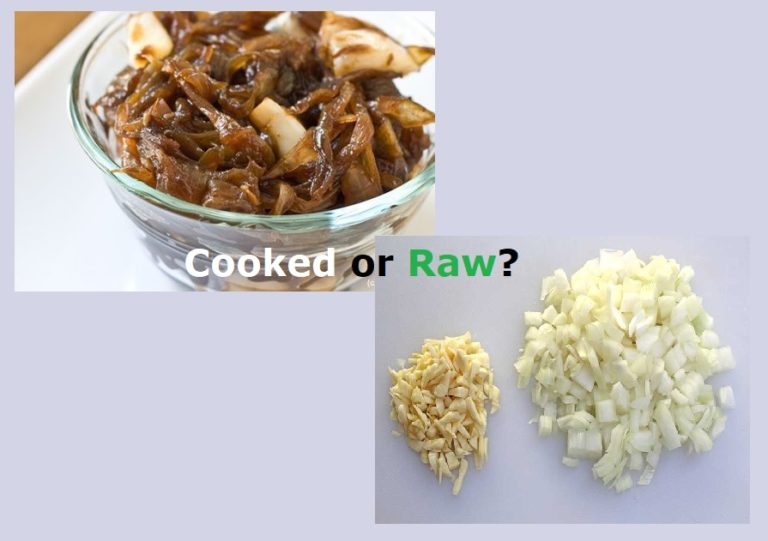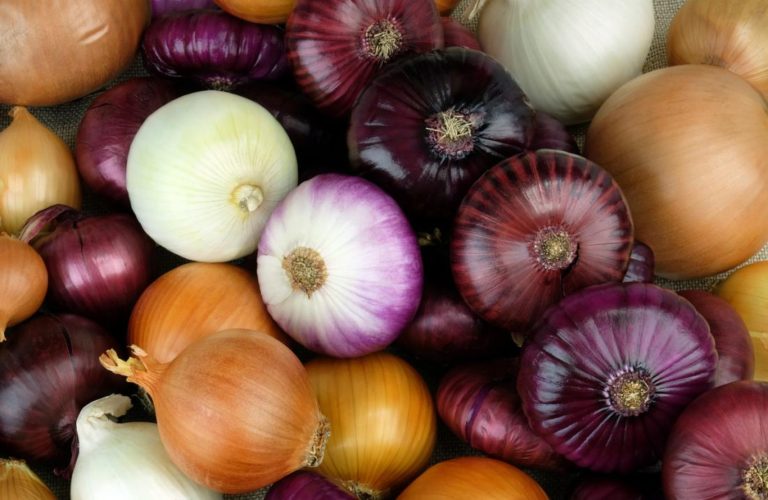
All vegetables contain health-promoting phytonutrients. Garlic and onions are, of course, right up there at the top of the list; but are the healthy compounds they contain made more available to our bodies when eaten cooked or raw? Research appears to provide some clues…
First, though, what are some of the health claims being made?
Blog Contents
Health benefits of garlic

Research suggests 1 2 3 that garlic has lots of health benefits, including:
- cardiovascular disease protection
- anti-clotting properties
- clot-busting abilities
- antioxidant properties
- blood pressure-lowering effects
- cholesterol-lowering effects
- age-related aorta stiffness-reducing effects
In fact, the blood-thinning ability of garlic is so efficient that doctors advise 4 patients to stop eating garlic a week before they arrive at hospital for elective surgery, presumably so that they don’t ‘bleed out’ on the operating table!
Health benefits of onions

It’s been shown 5 that onions (Allium cepa L.) contain compounds reported to have a range of health benefits, including:
- anticarcinogenic properties
- antiplatelet activity
- antithrombotic activity
- antiasthmatic effects
- antibiotic effects
Two of the most abundant groups of chemical compound are the following flavonoids 6 :
- anthocyanins 7 (which produce the red/purple colour in some varieties)
- flavanols 8 (e.g. quercetin and its derivatives which produce the yellow and brown skins of other varieties)
Cooked or raw?
So, are all the above health benefits most available to us when we eat garlic and onions cooked or raw?
The answer is: raw.
It appears 9 that the more you fry, microwave, boil, steam or bake your chosen allium 10 , the more these particular health benefits are removed. You’ll still get some benefits from having the likes of onion soup 11 , but not as many as from raw onions, and probably negated completely if there’s added oil and salt.
But which is best?
In terms of which is better for you, garlic or onions, an answer was provided by a study referred to earlier 12 which concludes: “The results of this study show that garlic is about 13 times more potent than onion in inhibiting platelet aggregation and suggest that garlic and onion could be more potent inhibitors of blood platelet aggregation 13 …” adding: “…if consumed in raw than in cooked or boiled form.”
What about the aftermath?
Many people avoid eating garlic and onions (particularly raw) because of the effects it has on their breath afterwards.
Reasons
With garlic, the smell on your breath is caused because a substance called alliin is converted to allicin when the inside of a garlic bulb are exposed to air. The allicin then converts into various sulphur-containing compounds that give garlic its distinctive smell.
With both garlic and onions, a compound called allyl methyl sulphide gets released when they are cut. This substance is then absorbed into your bloodstream, and ends up being emitted through lungs and skin pores. Additionally, with both garlic and onions, another sulphuric compound called cysteine sulphoxide causes an unpleasant odour on the breath almost immediately after the vegetables are eaten.
How to neutralise the odour
Here are eleven useful ideas:
1. Drink water to remove remnants from the tongue or between the teeth. This also stimulates saliva-production and gets rid of some of the bacteria that can add to the production of the smell.
2. Brush and floss. Bacteria like the plaque on the teeth and below the gum line. It also gets rid of food particles.
3. Use a tongue scraper. Not a lot of people do this, but bacteria, dead skin cells and tiny particles of food collect on here. Continue scraping until there is no residue left on the scraper. (Yuk!)
4. Rinse with mouthwash. Best to use one without added alcohol. Peppermint flavour is a good option.
5. Eat fresh veg with the meal and fresh fruits after it. Raw apple or raw lettuce apparently significantly reduce the odour of garlic on the breath.
6. Eat herb leaves. Chewing parsley is an age-old remedy for garlic or onion breath. It cleanses the palate and masks unpleasant odours. Also try mint leaves as they have been shown to significantly reduce garlic breath.
7. Try apple cider vinegar. A tablespoon of apple cider vinegar in water before or after meals apparently gets rid garlic and onion breath. Check this out a bit more before doing so, since it has no known general medical approval.
8. Chew (non-sugar) gum with a minty flavour. This also stimulates saliva production. Helps to remove food particles and bacteria, as well as helping to reduce cavities.
9. Drink a cup of green tea. It’s reported that green tea (maybe something to do with the catechins in it) may eliminate bad breath better than mints, chewing gum, or a product containing parsley oil.
10. Drink lemon water by adding a squeeze of fresh lemon juice (approximately 1 tablespoon) to a glass of water and drinking it after an onion- or garlic-rich meal. It seems to neutralise the odours.
11. Remove the core of the garlic before consuming. Cut each garlic clove in half and remove the stem from the middle of the bulb. This is where a lot of the odour-producing compounds reside.
Hope that helps…
Final thoughts
Heating garlic and onions for a short period of time (a minute or so) will not remove all the above health benefits; but it does appear that the best way to get the most from them is by eating them raw.
Try finely chopping onions into salads, crushing garlic into oil-free salad dressings, and adding both of them to a whole range of meals (sauces, soups, stews, etc) – but maybe add them at the last minute or so if you want to take advantage of all their health-promoting properties.

References
- Circulation. 1997 Oct 21;96(8):2649-55. Protective effect of chronic garlic intake on elastic properties of aorta in the elderly. Breithaupt-Grögler K, Ling M, Boudoulas H, Belz GG. [↩]
- J Nutr Health Aging. 2013 Jul;17(7):600-4. doi: 10.1007/s12603-013-0043-6. Garlic intake is an independent predictor of endothelial function in patients with ischemic stroke. Lau KK, Chan YH, Wong YK, Teo KC, Yiu KH, Liu S, Li LS, Shu XO, Ho SL, Chan KH, Siu CW, Tse HF. [↩]
- Nutr Rev. 2013 May;71(5):282-99. doi: 10.1111/nure.12012. Epub 2013 Mar 7. Effect of garlic on serum lipids: an updated meta-analysis. Ried K, Toben C, Fakler P. [↩]
- Ann R Coll Surg Engl. 2012 Sep;94(6):451. doi: 10.1308/003588412X13373405385098. Comment on: Not just a vampire repellent: the adverse effects of garlic supplements in surgery. Lawn A, Sains P. [↩]
- Phytother Res. 2002 Nov;16(7):603-15. Onions–a global benefit to health. Griffiths G, Trueman L, Crowther T, Thomas B, Smith B. [↩]
- Wikipedia: Definition of flavonoids [↩]
- Science Direct: More on anthocyanins. [↩]
- Science Direct: More on flavanols. [↩]
- Prostaglandins Leukot Essent Fatty Acids. 1999 Jan;60(1):43-7. Effect of raw versus boiled aqueous extract of garlic and onion on platelet aggregation. Ali M, Bordia T, Mustafa T. [↩]
- Wikipedia: More on allium. [↩]
- Br J Nutr. 2006 Sep;96(3):482-8. Ingestion of onion soup high in quercetin inhibits platelet aggregation and essential components of the collagen-stimulated platelet activation pathway in man: a pilot study. Hubbard GP, Wolffram S, de Vos R, Bovy A, Gibbins JM, Lovegrove JA. [↩]
- Prostaglandins Leukot Essent Fatty Acids. 1999 Jan;60(1):43-7. Effect of raw versus boiled aqueous extract of garlic and onion on platelet aggregation. Ali M1, Bordia T, Mustafa T. [↩]
- Platelet aggregation is the clumping together of platelets in the blood, and is part of the sequence of events that lead to the formation of a thrombus or clot. [↩]